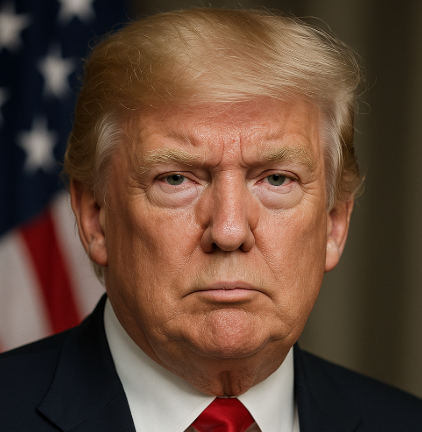President Trump Brokers Ceasefire Deal Between Iran and Israel:In a historic move, President Donald Trump announces a phased ceasefire agreement between Iran and Israel after a brutal 12-day war. The deal, brokered with Qatar’s assistance, aims to halt hostilities and prevent further escalation. As the world welcomes the ceasefire, experts warn of underlying risks tied to Iran’s nuclear ambitions and past missteps in U.S. foreign policy.
President Trump Brokers Ceasefire Deal Between Iran and Israel After 12-Day War
In a historic development, U.S. President Donald Trump announced that Iran and Israel have agreed to a phased ceasefire, bringing an official end to a 12-day-long war that had threatened to escalate into a much broader regional conflict. Speaking to U.S. media, Trump expressed optimism, calling the ceasefire potentially unlimited, stating, “I think it’s going to go on forever.”
According to senior White House officials, Israel consented to the ceasefire on the condition that Iran immediately halts its ongoing attacks. The agreement was reached through a complex web of direct and indirect negotiations. President Trump personally communicated with Israeli Prime Minister Benjamin Netanyahu while Vice President JD Van, Secretary of State Marco Rubio, and Special Envoy Steve Witkov engaged in backchannel diplomacy with Iranian representatives.
A key factor in brokering the agreement was the involvement of Qatar. Reports indicate that President Trump requested the Amir of Qatar to mediate with Iran. The Qatari Prime Minister successfully secured Iran’s initial consent on Monday, leading to Trump’s official announcement across his social media platforms.
The ceasefire was planned as a staggered, 24-hour process. Iran was to halt its operations six hours after the announcement, followed by Israel suspending its military actions 12 hours later. At the completion of the 24-hour window, the world would officially recognize the end of the 12-day war.
The ceasefire announcement came just hours after a significant escalation. Iran launched a missile barrage targeting Al Udeid Air Base in Qatar, the largest U.S. military installation in West Asia. Surprisingly, Trump downplayed the attack, calling it “very weak” and emphasizing the need for de-escalation. Trump even thanked Iran for providing advance notice before the missile launch, suggesting that Iran had “gotten it all out of their system.”
Iran’s National Security Council confirmed the strike, explaining it as a proportionate response to what it termed the “aggressive and insolent actions” by the United States against Iran’s nuclear sites. The Council noted that the number of missiles fired matched the number of bombs used by the U.S., signaling a deliberate effort to avoid further escalation.
However, Iran has yet to officially ratify the ceasefire agreement. Iranian Foreign Minister Abbasaki stated, “If Israel stops its aggression no later than 4:00 a.m., then we have no intention to continue our response afterwards.” He added that any final decision on halting military operations would be made later. Despite the diplomatic progress, a series of powerful explosions rocked Tehran early Tuesday morning, only hours before the ceasefire was set to commence.
Political analyst and lawyer Steven Golub provided a sobering analysis of the situation. While acknowledging that the ceasefire is a positive development, he cautioned against premature optimism. Golub remarked on the irony of Trump’s declaration by referencing President George W. Bush’s infamous “Mission Accomplished” speech in 2003 after the invasion of Iraq, a conflict whose destabilizing consequences continue to reverberate.
Golub emphasized the precarious nature of the ceasefire, pointing out that Iran might use this temporary pause to regroup, rebuild its military, and potentially advance its nuclear ambitions covertly. He warned that while the bombing of Iran’s nuclear facilities may have served immediate security interests for the U.S., Israel, and even India, the broader strategic question remains unresolved: Will Iran genuinely step back, or is it merely buying time?
The analyst also criticized Trump’s prior decisions that may have worsened the current crisis. He highlighted that the U.S., under the Obama administration, had previously reached a comprehensive nuclear agreement with Iran, involving Russia and other global powers. This accord imposed strict inspections to ensure that Iran’s nuclear program remained peaceful. Trump’s withdrawal from this agreement in 2018 dismantled a crucial safeguard, leaving the world in a more unstable state.
Golub raised further concerns about the potential clandestine relocation of Iran’s nuclear materials. He noted reports of suspicious truck movements near nuclear facilities prior to the U.S. strikes, suggesting that Iran may have dispersed key materials to secret sites across the country. This maneuver, Golub argued, was inadvertently facilitated by Trump’s public threats, which may have alerted Iran to the possibility of imminent military action.
In conclusion, while the ceasefire marks a moment of relief, the underlying tensions remain unresolved. The world watches closely to see whether Iran will fully comply with dismantling its nuclear capabilities or whether the pause in hostilities will simply serve as a tactical delay. The Trump administration has achieved a temporary halt to violence, but the long-term stability of the region hinges on robust verification measures and sustained diplomatic engagement.

